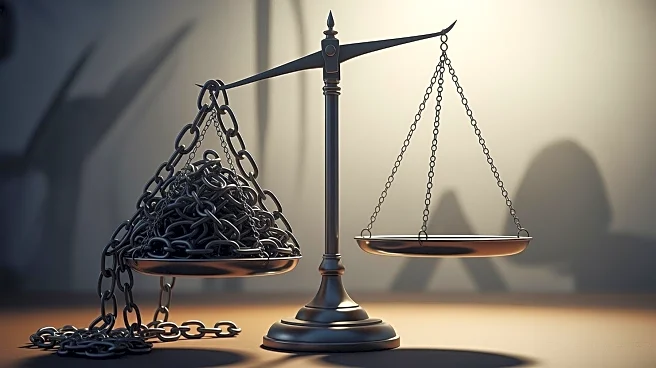What's Happening?
Western sanctions on Iran, intended to target government leaders with minimal civilian impact, have significantly affected the Iranian middle class, according to a study published in the European Journal of Political Economy. The sanctions, which have been
in place since 2012, have led to a shrinking middle class, increased societal resentment, and a widening wealth gap. The study used a synthetic control method to compare a non-sanctioned 'twin' of Iran with the real, sanctioned Iran, revealing that the middle class would have expanded by 17% without sanctions. By 2019, the middle class was 28% smaller than it should have been, with approximately 9 million people losing middle-class status between 2011 and 2019. The sanctions have also led to increased unemployment and inflation, with basic goods prices rising significantly.
Why It's Important?
The shrinking of Iran's middle class has broader implications for the country's political and social stability. Historically, the middle class has been a force for political moderation and reform in Iran. The sanctions have weakened this segment, leading to increased inequality and societal resentment. The economic pressure has shifted political engagement from middle-class demands for rights and reforms to working-class cries for survival. This shift could lead to more fragmented and volatile protests, which are vulnerable to state repression. The sanctions have also strengthened state-linked and security-sector players, entrenching hardliner power and reducing the influence of independent economic actors.
What's Next?
Rebuilding Iran's middle class is a generational challenge that cannot be quickly resolved, even if sanctions were lifted. The current economic conditions have increased reliance on government services, which are themselves affected by sanctions. This creates an unsustainable situation that could further destabilize the country. The potential for renewed conflict and continued economic hardship remains, with the middle class's role in driving reform efforts significantly diminished.
Beyond the Headlines
The sanctions have not only economic but also political and social implications. They have altered the dynamics of protest movements in Iran, shifting the focus from long-term political engagement to immediate economic grievances. This change could lead to a more volatile and repressive environment, as the government may respond harshly to fragmented protests. The sanctions have also contributed to a reverse Robin Hood effect, where resources are taken from the middle class and poor to enrich the powerful, exacerbating inequality and societal tensions.















